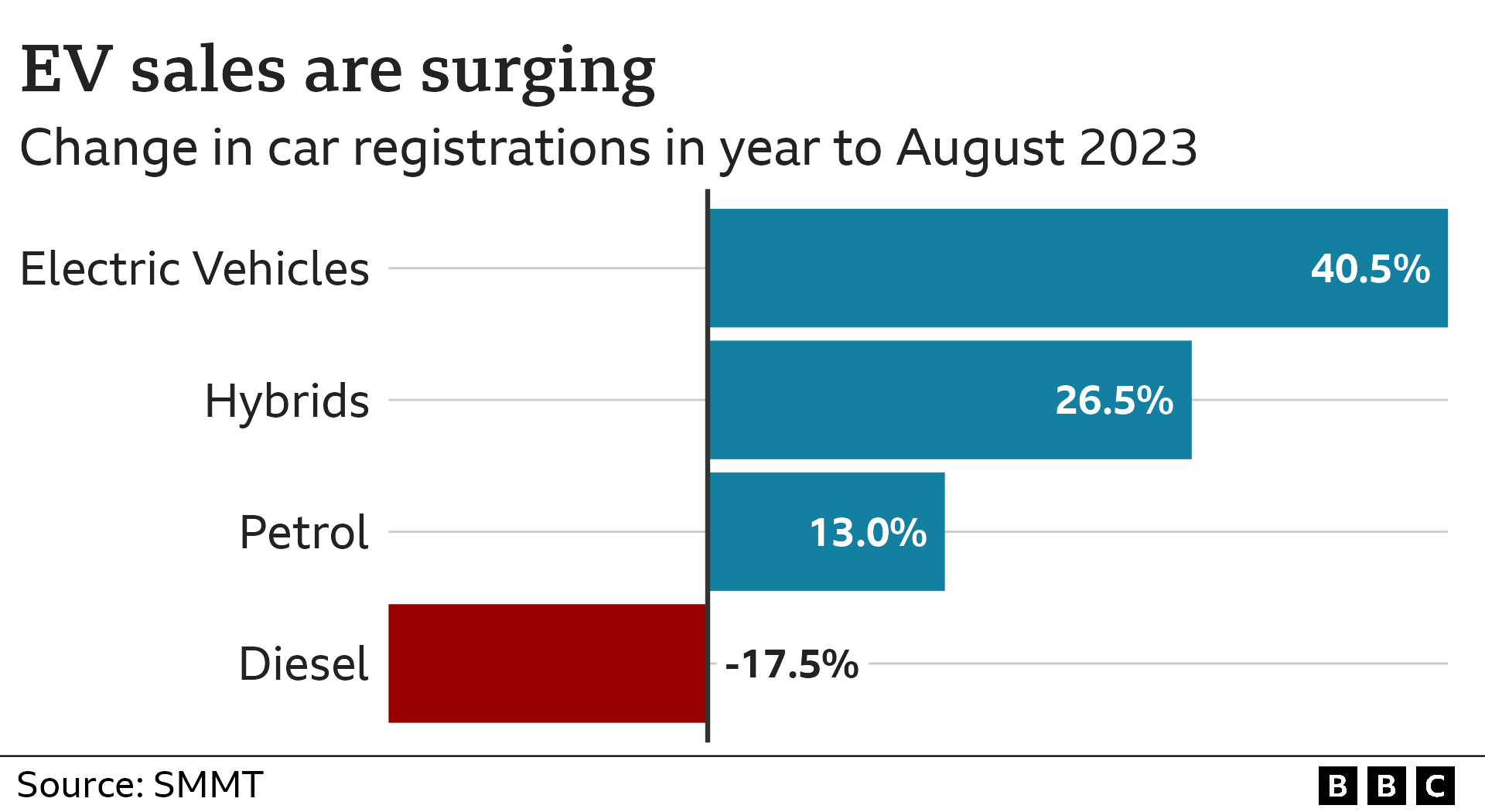

The boss of car giant Ford has hit out against a possible delay to the ban on sales of new petrol and diesel cars, saying it would “undermine” its plans.
Ministers are understood to be considering pushing back a planned ban from 2030 to 2035 to save money.
Concerns have been raised by the UK car industry that a delay could put off drivers switching to electric, with Ford saying the 2030 goal was “vital”.
But a drivers campaign group said it was “delighted” by a potential delay.
Fair Fuel UK said the costs of the policy would outweigh the benefits and it was “always doomed to be dropped”.
On Tuesday, the BBC was told by multiple sources that Prime Minister Rishi Sunak was considering weakening the plan, along with several other green commitments, to save money.
In response to the potential delay, Ford, one of the UK’s most popular car brands, selling more than 126,000 vehicles in 2022, said the change would “undermine” the move to electric.
Lisa Brankin, Ford UK chair, said the 2030 target “is a vital catalyst to accelerate Ford into a cleaner future”, adding the company had already invested £430m in upgrading its UK plants to produce electric cars.
“Our business needs three things from the UK government, ambition, commitment, and consistency. A relaxation of 2030 would undermine all three,” she added.
Stellantis, which owns Vauxhall, Peugeot, Citroen and Fiat, said it was “committed to achieve 100% zero emission new car and van sales in the UK and Europe by 2030”, regardless of any potential delay to the ban.
But it added: “Clarity is required from governments on important legislation, especially environmental issues that impact society as a whole.”
Anna Valero, an economist on Chancellor Jeremy Hunt’s advisory committee, said a delay would be “bad for the UK” and “yet another example of policy volatility that prevents businesses taking the long-term investment decisions needed for a stronger, more resilient and sustainable economy”.
Mike Hawes, chief executive of the Society of Motor Manufactures and Traders (SMMT), said consumers would be sent an “incredibly confusing” message if the ban was delayed.
“The concern now is, does this cause consumers to delay their purchase [of an electric car]?,” he told the Today programme.
“We are questioning what is the strategy here because we need to shift the mobility of road transport away from fossil fuels towards sustainable transport and we don’t know quite what is going to happen now,” he added.

Edmund King, president of the AA motoring group, said the 2030 goal was “ambitious but achievable”, but added what the car industry and drivers wanted was “more certainty so they can plan for the future”.
However, there have been concerns about the high cost of many electric vehicles, along with fears the UK is not expanding its charging infrastructure fast enough.
Mechanic Chloe Hudson told BBC Newsbeat. that while a ban was good for the climate, the cost of living also played a part, and spare parts for hybrid and electric cars were expensive and unaffordable to some people.
“When something goes wrong, is that person then prepared to spend thousands of pounds on their vehicle?” said the 25-year-old from Birmingham
The ban potentially being delayed comes as the UK car industry has been ramping up investment in zero-emission cars.
Earlier this month, German car giant BMW announced plans to invest hundreds of millions of pounds to prepare its Mini factory in Oxford to build a new generation of electric cars, while Jaguar Land Rover-owner Tata confirmed plans in July to build a £4bn battery plant in Somerset.
The government has backed these projects with subsidies.
BMW sources said pushing back the ban to 2035 would not change its plans and rubbished reports suggesting the government had promised to keep the 2030 target as a condition for its recent investment.
Jaguar Land Rover said its net zero plans were “on track” and said it would “welcome certainty around legislation for the end of sales of petrol and diesel powered cars”
Philip Nothard, insight and strategy director at Cox Automotive, said it was important to remember that manufacturers were “already well on the way to phasing petrol- and diesel-powered models out”.
He said many carmakers were already committed to hybrid and electric-only ranges ahead of 2030, so if the ban was pushed back to 2035 consumers would face a “limited choice” of new petrol and diesel cars, which would likely be more expensive that greener cars.
Separately, Mr Hawes said he was “assured” that the zero emission vehicles mandate, a requirement that 22% of cars sold by each manufacturer will be zero emission from 2024, would still be introduced. – bbc.com